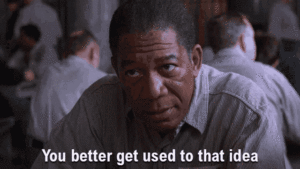For most kids, at least the kids I grew up around, the idea of eating vegetables is not an appealing one. Growing up, there seemed to be a constant effort from parents to try and persuade their kids to forego sugary sweets in favor of the healthier, but far less tasty, vegetables. And when that inevitably didn’t work, the rule in my house was that you had to eat your entire meal, especially the vegetables, before you were allowed to have dessert.
Why?
Because vegetables are good for you. While they may not be the most pleasant thing to eat when you’re a kid, they provide the vitamins and nutrients your body needs. It’s important to throw in a piece of broccoli every once in a while between bags of Cheetos.

Parents are constantly trying to get their children to eat their vegetables because they want to instill healthy eating habits and provide a strong foundation of health for their future.
I’ve been thinking about “financial vegetables” recently. Things that are important for our long-term financial health that we tend to ignore or put off due to the short-term distaste of tackling them. Eating your financial vegetables is doing basic things like:
• Spending less than you earn
• Having sufficient cash for unexpected emergencies and upcoming purchases
• Implementing a debt management plan
• Carrying the appropriate amount of insurance coverage for your situation
• Maintaining a high savings rate (20% of your gross income is a good target)
• Consistent, diversified investing, with a long time horizon
While these may not be the sexiest or most exciting financial concepts, they’re absolutely crucial to building a strong financial foundation.
And just as a single green smoothie on a random morning isn’t going to do much for your overall health, these principles need to be executed over and over and over again in order to build a healthy financial life. While simple, it’s hard to stay dedicated for long periods of time.

One of my favorite thoughts from James Clear, author of the book Atomic Habits, is:
“The greatest threat to success is not failure but boredom. We get bored with habits because they stop delighting us. The outcome becomes expected. And as our habits become ordinary, we start derailing our progress to seek novelty.”
It’s boredom that causes us to get caught in a never-ending cycle of jumping from one investment to the next, one workout to the next, one diet to the next, one business idea to the next. Whenever we lose motivation, we have a tendency to seek a new strategy — even if the old one was still working.
In his book, James Clear goes on to say the only way to become excellent is to be endlessly fascinated by doing the same thing over and over. You have to learn to love eating your vegetables.

Vegetables also provide your body with vitamins and nutrients that reduce the risk of illness or disease. Similarly, eating your financial vegetables will help create a healthy financial foundation that’s able to withstand various economic environments and whatever life may throw your way.
Then, after you’ve eaten all of your vegetables, feel free to enjoy some dessert. Once you’ve established healthy financial habits you can then afford to speculate and take more risks with a portion of your money. It can be a more concentrated investment in individual stocks, or NFTs, or cryptocurrency, or art, or baseball cards, or private equity, or any other venture that you’re interested in.

Even if these speculative bets don’t pay off, your future financial goals won’t be in jeopardy because of the healthy foundation you’ve laid.
“More than I want big returns, I want to be financially unbreakable. And if I’m unbreakable I actually think I’ll get the biggest returns because I will be able to stick around long enough for compounding to work wonders.” — Morgan Housel
Too often people get bogged down in the minutiae of trying to choose the best investments, figure out the economic environment, time the market, guess the direction of interest rates and focus on the complexities of the financial markets that are completely out of their control.
Watching macro trends isn’t inherently a bad thing. But if your focus on things outside of your control comes at the expense of attention to the boring but important basics, it can be disastrous for your finances.
If you want to think about this as a strategy, keep in mind that opportunity lives where others aren’t, and others tend to stay away from eating their vegetables — financial or otherwise.
Thanks for reading!

